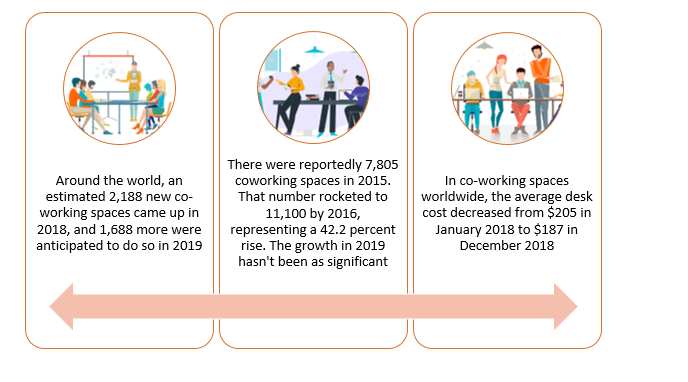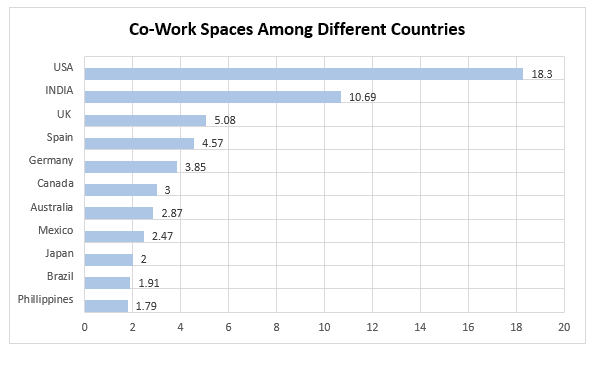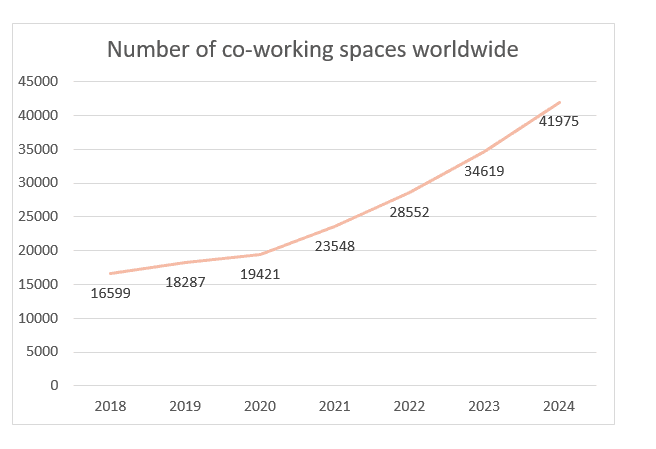- Home
- About Us
- Industry
- Services
- Reading
- Contact Us
Rise of Co-Working Spaces: Revolutionizing Work Culture and Collaboration
Author: Vikas Kumar
June 30, 2023
Traditional office spaces in various corporate structures have been a consistent problem since the concept of offices was introduced. The idea of co-working changed around 1995 as a result of advancements in technology. In San Francisco in 2005, a programmer named Brad Neuberg coined the phrase ” co-working” He responded to his job’s lack of productivity.
One of the largest democratic nations, India was still developing and adjusting to the idea of co-working like other nations. co-working is now a fantastic paradigm that has been widely embraced and used in important Indian cities like Bangalore. In Bangalore, you may discover fully equipped shared office space that changes the way the workplace feels.

Many independent contractors and business owners join co-working spaces for the networking opportunity, whether they’re official company events or just a mid-afternoon conversation over coffee.
Users have the chance to interact with people from all backgrounds and industries while they are at the co-working space, which has been shown to be beneficial for company. More than 40% of co-working members who responded to a recent poll said they started a business with someone they met there. At the very least, 52% of respondents claimed that co-working had aided in friend-making.
Co-Workspace in Different Geography
With more than 3,700 shared workplaces spread across the nation, the United States continues to dominate as the largest market. India (2,197 spaces) and the United Kingdom are next (1,044 spaces). Germany and India are the two largest markets with the fastest annual growth rates in 2020, followed by the US and Canada

Market Insights
- Even though the Co-working market is expected to grow at around half the rate of the previous two years in 2020, the overall outlook for 2021 and beyond is very optimistic, as were the attitude of Co-working operators prior to Covid-19.
- Approximately 77% of the Co-working operators questioned, according to statistics from the 2019 Co-working Member’s Choice Awards, stated they intended to grow by adding more sites before the coronavirus impacted the global economy.
- By 2020, 32% of operators indicated they intended to open one new site, while 38% said they intended to open two to three
- 52.03% of respondents run a single location under their brand’s umbrella, compared to 28.61% who run two to three and 12.62% who run eight or more
- It is anticipated that there will be close to 20,000 co-working spaces worldwide this year and more than 40,000 by 2024. While the industry is anticipated to expand more slowly in 2020, we anticipate -growth to pick up and advance even more quickly starting in 2021, with a yearly growth rate of 21.3%.
- By 2024, nearly 5 million individuals will be working from co-working spaces, up 158% from the previous year

Conclusion
When working in a shared office setting, staff members arrive prepared to interact with co-workers, share expertise, and exchange ideas. Compared to corporate offices, a shared workspace offers far more flexibility. For new businesses, independent contractors, and freelancers, shared office space for rent in Bangalore is the most productive setting. Recognize that as shared office spaces have evolved, they have created new opportunities for learning, information sharing, and the exploration of bigger, brighter ideas while also facilitating a number of other factors.
Author: Kartik Barrot
Get a Callback
